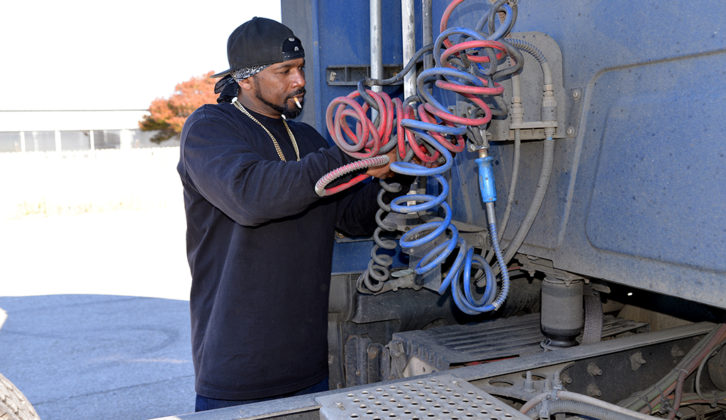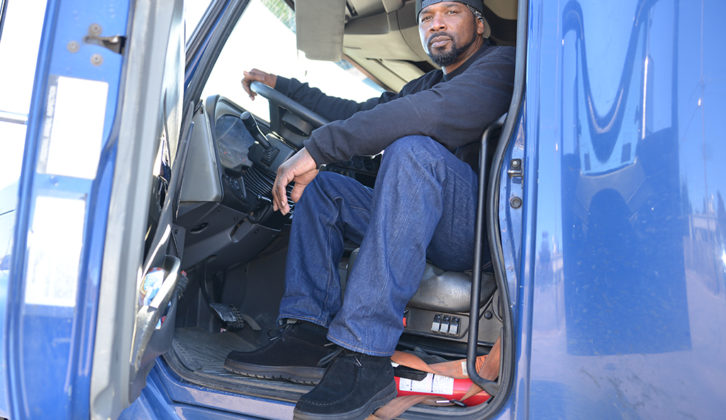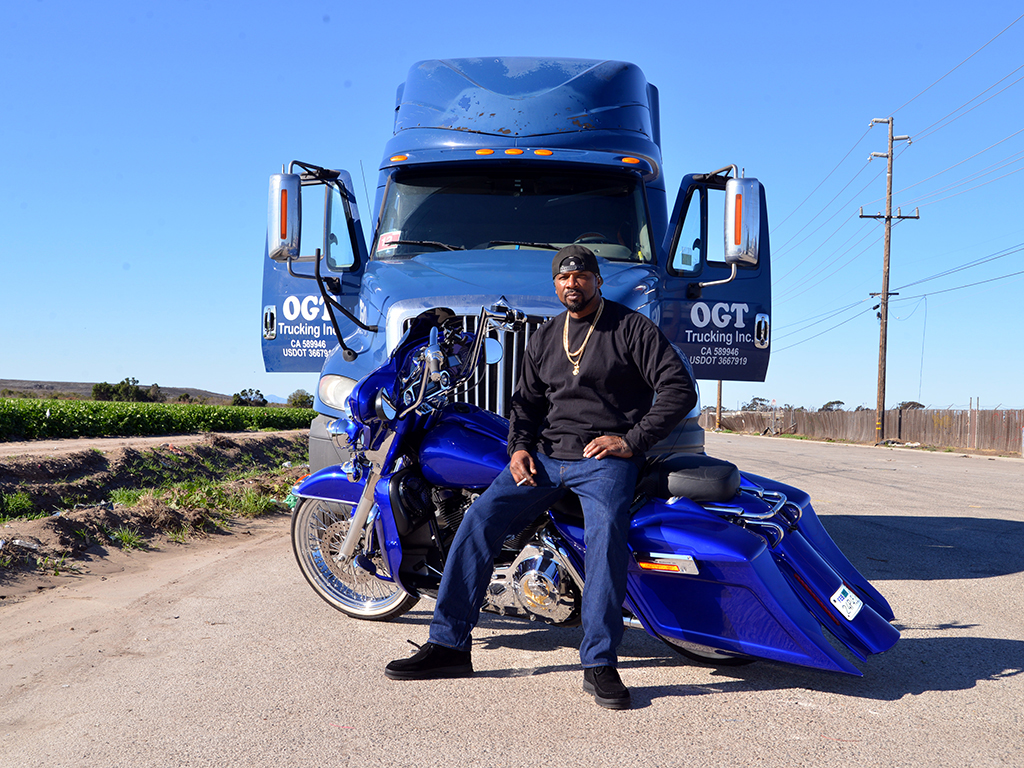Looking for more stories on this topic and other HR issues? Sign up for SmartBrief on Workforce.

Tyrone Gladney remembers the moment he decided he was done with prison life.
“I’m walking on the yard with my buddy when this young dude say to me, ‘What’s up, OG?’ And I look at him and I ask my buddy, ‘What the hell? Who he talking to?’” Gladney’s friend laughed as he responded: “He talking to you, TMan. You OG now.”
The realization hit Gladney like a tsunami. “I said, ‘I’m done,’ ” he recalls telling his friend. “I was in his shoes calling the older people ‘OG’ and they called me ‘youngsta.’ Now I’m sayin’ ‘What’s up, youngsta?’ and they call me OG. I’m done.”
The experience marked a shift in Gladney’s life. Thirty-three years old at the time, he had spent roughly 15 years in and out of prison, for various charges. When his sentence ended, Gladney moved to Florida to begin anew. He took a job working for his brother, doing security, but knew it wasn’t the right fit for him.
“I had a problem with authority,” he explains. “I knew right then I couldn’t have no boss. I can have somebody that I can work with — to get they money — but as far as them telling me when to do it or how to do it, it’s not gonna happen.”
Gladney began making plans to start his own trucking business. “I got my trucking license when I was 20,” he says. “I was going back and forth to prison, though, so I was never using it. When I got out, I put it to use.”
He sure did. Today Gladney has his own truck, earns a comfortable six-figure salary and is actively working to grow his business. His expansion plans include hiring more people who have criminal records.
“Hiring a formerly incarcerated person is probably one of your best assets,” says Gladney. “If you need them to do something, they’re gonna do it. You got good workers that have either been on drugs or been incarcerated and never had a chance to show what they were.”
More employers are warming to the idea of hiring people who have criminal records, especially amid the Great Resignation when there are more jobs than there are people to fill them. A 2021 survey by the Society of Human Resource Management and the Charles Koch Institute found that 53% of HR professionals are willing to hire people who were formerly incarcerated, a jump from 37% in 2018.
But how do you do this right? What should you look for – and what should you avoid? SmartBrief spoke with Gladney about his recruiting tactics and what employers should know as they aim to tap this talent pool.
Look for work ethic
Find people who want to work. “If you need a job, you want to work, like, yesterday,” Gladney says. “Any time I got an application and the company asked when I could start, I said, ‘I can start now if you need me to.’ That lets the person know you are serious.”
Gladney credits his father for teaching him respect for hard work. “I got my roots — my work ethic — from my father,” he says. Gladney’s father, a construction worker, spent his afternoons after work building onto the family’s house. He paid his children to help. Gladney remembers early mornings spent wetting down houses and doing stucco work. “It just grew on you. We had to work,” he says.
Gladney now looks for the same work ethic when he recruits. It was a lesson he learned the hard way. When he relocated back to California from Florida, he became a contractor for a moving company and hired a crew. The money was good, but managing the crew became a headache.
“I had 13 to 16 employees at a time. Some of them come drugged up; some don’t show up. Some showed up late, and some were stealing. A lot of them were breaking stuff,” he says. “In claims alone, I was paying $18,000 to $20,000 per year – that’s coming out of my pocket.”
Now, as Gladney aims to expand his fleet and hire more drivers, he seeks out people hungry for work and sets expectations from the start.
“I’mma [sic] let you know: If you [screw] up with my company, you outta here,” he says. He expects workers to be on time and do their work without constant supervision. “Just do what you gotta do. I ain’t got no time to play with you,” he says.

Reserve judgment
Too many employers make assumptions about former felons because of their appearance or prison record, according to Gladney. This bias can keep employers from seeing talent that’s right in front of you, he says.
Gladney recalls interviewing for a driver job at a company that hauled cement. He knew the hiring manager was scrutinizing his appearance. He asked Gladney if he was on parole or probation. Gladney lied and said he wasn’t. He got the job. Two weeks later, Gladney was called into the hiring manager’s office.
“He said, ‘Your parole officer called,’ ” Gladney remembers. Knowing he was caught, he decided to be honest with the manager.
“I said, ‘I’m gonna be real with you, Tom. I told you ‘no’ because if I told you ‘yeah,’ you wouldn’t have given me a chance to show you what I can do,’ ” Gladney explains. The manager admitted he was likely right, acknowledged that Gladney was a competent driver and sent him back to work.
Give people a chance instead of judging them, Gladney advises. “If you give somebody who’s been incarcerated a chance at a job, eight times out of 10 they will prove to be one of the most loyal persons to you because you were actually looking out for them and giving them a chance,” he says.
Pay them well
People reentering society after prison want to make enough money to take care of their responsibilities. This can be tough on minimum wage, especially if they face financial obligations stemming from their crimes. They need job opportunities that allow them to make as much money as they need, Gladney says.
“It feels good when a person gets out and is able to get a check and provide for their family,” he explains. “You make him look forward to something instead of looking towards ‘I gotta go to this job.’ ”
Advancement matters too, according to Gladney. “People get stuck in one place if they don’t have opportunity,” he says. “Once they get stuck, they get bored. Now [they’re] going to start finding things to do and could get into trouble. They have to stay busy. They need to advance.”
Hire those who ask questions
Gladney looks for people who are teachable and unafraid to ask questions if they are unfamiliar with something.
“I got that from my dad too,” says Gladney. “He told me, ‘Don’t be a dummy. If you go do something and don’t know what the hell you’re doing and you do it two to three times and do it wrong, then you still have to come back and ask how to do it. If you don’t know, ask.’ ”
Some people struggle to admit they don’t know something. “A lot of dudes deal with that personal fear and pride. Their pride is going to [mess] them up,” he says. Gladney encourages people who were formerly incarcerated to push past this hurdle.
“My thing is, always ask,” he says. “You’ve got to be willing to learn. You’ve got to be willing to learn.”
Build relationships with parole, probation officers
Gladney works with the local parole office to find workers. He remembers the first time he visited the office with his job-hiring flyer.
“They were like, ‘Who did you come here to see? Who’s your parole officer?” Gladney recalls, laughing. He explained what he was doing and received permission to post his flyers in the office and lobby areas.
Gladney has hired several workers referred to him through the parole office and earned the officers’ trust. They appreciate his blunt, straightward style of working with former inmates – “If you don’t want to work, do not call me” – and contact him regularly to place workers in jobs.
“They see a different side of me and are like, ‘Wow, this dude really is a hustler!’ ” he says. “They call me all the time. ‘You got any openings, Tyrone? We got this one guy. He got out and he needs some work.’ ”

Let them face the dragon
Gladney says some former felons have difficulty with reentry. The ones who are successful are the ones who get right and get a job. Those who don’t find a job or don’t look for a job in the first two to four weeks after they get out will struggle and likely go back to jail. They can’t function without the routine of jail.
“Prison programs you,” he explains. “That’s a mindset that’s institutionalized. You need someone who can think for themselves.”
Some employers may be tempted to help former felons adjust to their new lives, but Gladney cautions against this.
“When they get out, they need to organize themselves; otherwise, they get used to [others helping them],” he says. He gives the example of an employee who has someone else wake them up daily to get to work. “That’s bad. If you always get them up, and then one day you don’t and they’re late, they’ll blame you. They get used to blaming others for their mistakes.”
Successful reentry starts with the individual, Gladney says. They have to take responsibility for finding their way and making a new start.
“They have to fight it themselves,” he says. “They have to face the dragon. They have to learn.”
Kanoe Namahoe is the director of content for SmartBrief Education and Business Services. Reach her at [email protected].
